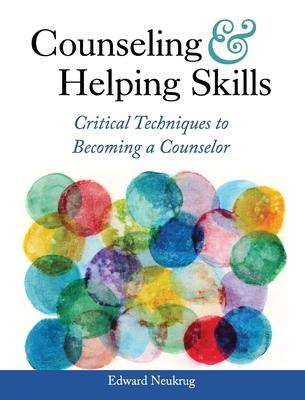Counseling and Helping Skills: Critical Techniques to Becoming a Counselor provides counselors and other helping professionals with a complete guide to developing the skills and competencies necessary to support a diverse spectrum of clients.
The text is divided into two sections. Part I begins with a chapter that describes nine characteristics of an effective counselor and then moves on to chapters that examine foundational, essential, and commonly used skills. Some skills discussed include nonverbal behaviors, forming an equal relationship, non-pathologizing, honoring and respecting clients, listening, empathy, affirmation giving, offering alternatives, self-disclosure, modeling, collaboration, and more. A separate chapter on information-gathering and solution-focused questions is provided next. Part I concludes with a chapter on specialized skills such as advocacy, assessment for lethality, confrontation, cognitive-behavioral responses, interpretation, positive counseling, life-coaching, and crisis, trauma, and disaster counseling.
Part II focuses on treatment issues, including chapters dedicated to case conceptualization; case management, such as DSM-5, psychotropic medications, writing case notes, and more; cultural competency, which describes models of culturally competent counseling and considerations when working with eleven select populations; ethical, professional, and legal issues, which examines the purpose of ethical codes, ethical decision-making, ten critical areas in ethical codes, vignettes, best practices, and malpractice insurance.
Comprehensive in nature and filled with valuable insight, Counseling and Helping Skills is ideal for graduate-level counseling and related programs. It can also be used by those entering the helping professions to support their transition into the field and serve as a helpful ongoing reference.
Dr. Edward Neukrug is a professor of counseling and human services at Old Dominion University. A licensed professional counselor and licensed psychologist, he has experience in outpatient therapy, crisis counseling, substance abuse counseling, couples and family counseling, private practice, and as a school counselor. Dr. Neukrug is a nationally known author, presenter, and researcher. He is the author of eleven books: The Dictionary of Counseling and Human Services; Skills and Techniques for Human Service Professionals; Counseling Theory and Practice (2nd ed.); The World of the Counselor (5th ed.); Experiencing the World of the Counselor: A Workbook for Counselor Educators and Students (4th ed.); Theory, Practice and Trends in Human Services: An Introduction to An Emerging Profession (6th ed.); Essentials of Testing and Assessment for Counselors, Social Workers, and Psychologists (3rd ed.); A Brief Orientation to Counseling: Professional Identity, History, and Standards (2nd ed.); Skills and Tools for Today's Counselors and Psychotherapists; Counseling and Helping Skills: Critical Techniques for Becoming a Counselor; and Sage Encyclopedia of Theory in Counseling and Psychotherapy (editor).
